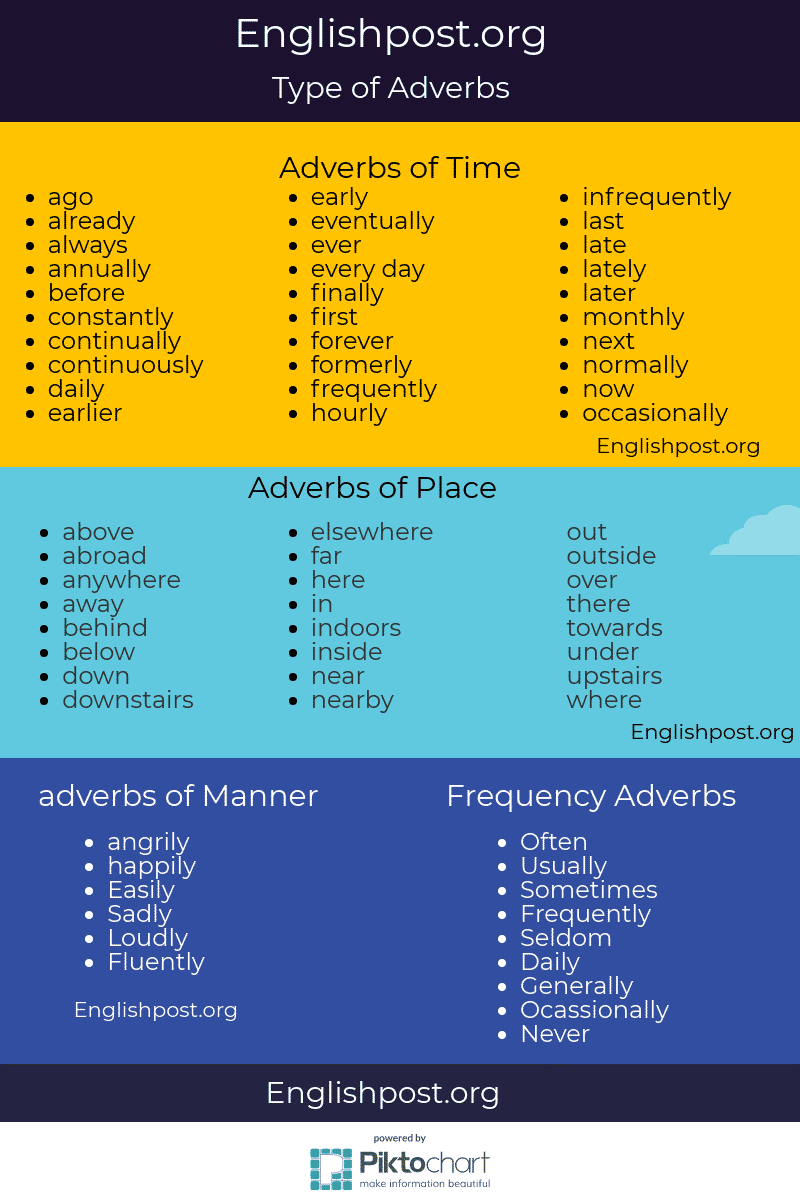An adverb can modify a verb, an adjective, another adverb, a phrase, or a clause.
There are different types of adverbs in English such as adverbs of time, adverbs of frequency, adverbs of manner, adverbs of time and adverbs of degree.
An adverb indicates manner, time, place, cause, or degree and answers questions such as “how,” “when,” “where,” “how much”.
Table of Contents
- Sentences with Adverbs in English
- Types of Adverbs in English
- Adverbs of Time: Definition and Examples
- Adverbs of Place: Definition and Examples
- Adverbs of Manner: Definition and Examples
- Adverbs of Degree: Definition and Examples
- Adverbs of Frequency: Definition and Examples
- Adverbs in Quantity: Definition and Examples
- Adverbs of Probability: Definition and Examples
- Types of Adverbs Infographic
Sentences with Adverbs in English
These are some examples of sentences with adverbs in English
- He drives his car slowly
- His car is quite fast
- I did not put it there
- Press the button now.
- He ran yesterday.
- He ran here.
- He ran quickly
- She is singing a song loudly
Types of Adverbs in English
These are the different types of adverbs with definition and examples.
- Adverbs of time
- Adverbs of frequency
- Adverbs of manner
- Adverbs of place
- Adverbs of degree
Adverbs of Time: Definition and Examples
An adverb of time provides more information about when a verb takes place
| Never | Lately |
| Just | Always |
| Recently | During |
| Yet | Soon |
| Sometimes | Usually |
| Hardly ever | Already |
| Now | Today |
| still | Tomorrow |
Sentences with adverbs of time
- Have you seen Marie Today?
- I am leaving early tomorrow
- She already paid the bills
- He usually goes running every morning
- I went to the cinema yesterday
- Have you watched any independent films lately?
- I have a job interview tomorrow morning
- I have to take the bus soon
- I come to this museum regularly.
- I get up very early sometimes.
- She is going to have a baby soon.
- My father went to Chile last year for a vacation.
- My brother seldom gets angry at us.
Adverbs of Place: Definition and Examples
Place adverbs tell us about where something happens or where something is.
| here | there |
| outside | into |
| nowhere | anywhere |
| everywhere | out |
| in | above |
| below | inside |
Sentences with adverbs of place
- She is inside the house.
- I looked everywhere and I couldn’t find it.
- Look outside, it is raining.
- Your mother will come here in a minute
- They live somewhere in Paris
- She is talking outside with some guys I have never met before
- I placed the keys over there behind the counter
- There was somebody standing nearby.
Adverbs of Manner: Definition and Examples
Manner adverbs tell us about the way something happens or is done.
| Neatly | Slowly |
| Quickly | sadly |
| Calmly | Politely |
| Loudly | carefully |
sentences with adverbs of manner
- She spoke very loudly during the conference
- I don’t understand why she drives so carefully
- She ran very slowly, she might be injured.
- You have to ask for things nicely
- They are living happily
- She quickly entered the room and then left
- Driving fast is dangerous
- Sarah is driving carelessly
- People always spell my name wrong.
- Let’s go straight to the airport.
Adverbs of Degree: Definition and Examples
Degree adverbs express degrees of qualities, properties, states, conditions and relations
| almost | quite |
| nearly | too |
| enough | just |
| hardly | so |
| fully | greatly |
| incredibly | simply |
| somewhat | strongly |
| completely | terribly |
Adverbs of degree examples
- She didn’t work hard enough
- I was too tired to continue playing
- I just got here
- The building was completely destroyed.
- She entirely agrees with him.
- Mary is verybeautiful.
- He drove quite dangerously.
- She worked awfully hard on her essay.
- Whole species have vanished completely
- He became quite interested in politics and law
Adverbs of Frequency: Definition and Examples
Use adverbs of frequency to discuss how often something happens.
| Never | Always |
| Rarely | Sometimes |
| Normally | Seldom |
| Usually | Again |
Examples of sentences with adverbs of frequency
- I never go running with my friends
- I won’t do that again, it is dangerous
- She usually goes to the supermarket
- She normally eat three meals a day
- Sometimes I go to school to visit my colleagues
- She always calls me or send me messages
- They rarely go to the movie theater
- She sometimes visits me at home.
- We usually drink coffee.
- I meet him several times a year.
- I visit my parents once a month.
- They always hang out together.
- The Northern Lights are usually green.
Adverbs in Quantity: Definition and Examples
Quantity adverbs modify the quantity or intensity of an adjective, a verb, or another adverb.
Quantity adverbs typically are placed immediately before the words they modify.
Some common quantity adverbs are almost, completely, especially, extremely, hardly, just, nearly, only, quite, really, relatively, and very.
These are examples of adverbs of quantity
- He didn’t study enough for the exam
- It is almost full.
- You speak too much
- I have a few problems
- He spends little time with his family.
Adverbs of Probability: Definition and Examples
Adverbs of probability are used to show how sure we are about a situation or event.
The most common adverbs of probability are: definitely, certainly, clearly, obviously, possibly, perhaps, probably, maybe.
These are some example of adverbs of probability
- Perhaps the weather will be fine.
- Maybe it won’t rain.
- Obviously she was very surprised.
- Possibly we will come to England next year
Types of Adverbs Infographic
This is an infographic that includes examples of the different type of adverbs.
The type of adverbs included are:
- Adverbs of Time
- Adverbs of Place
- Adverbs of Manner
- Adverbs of Frequency


